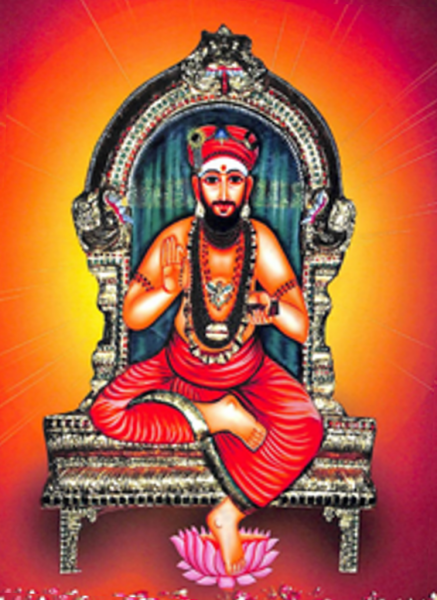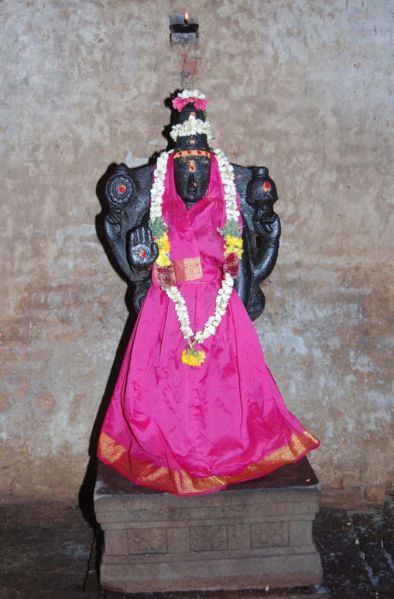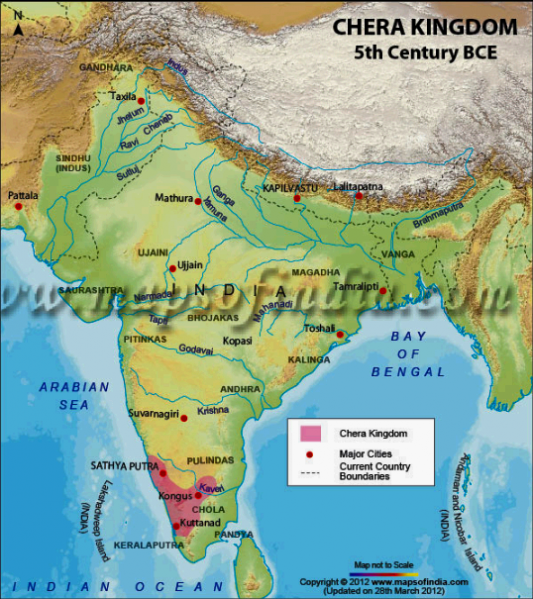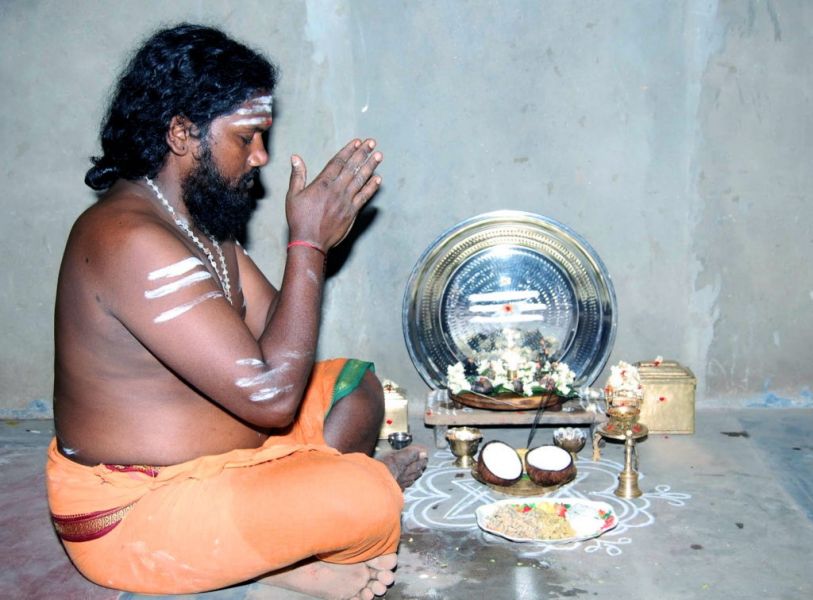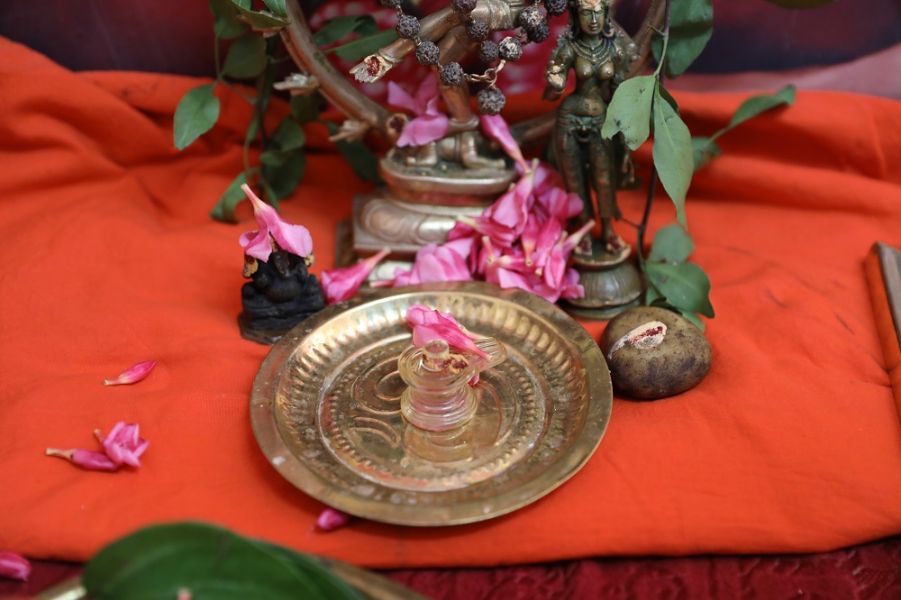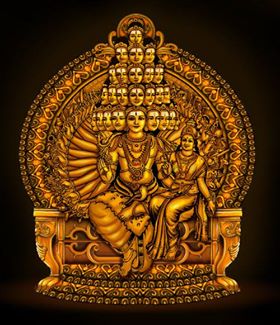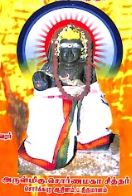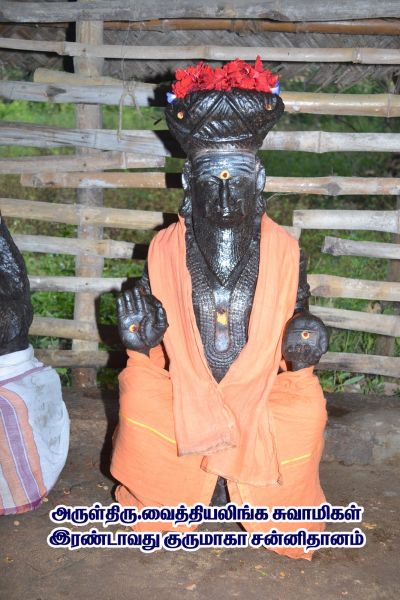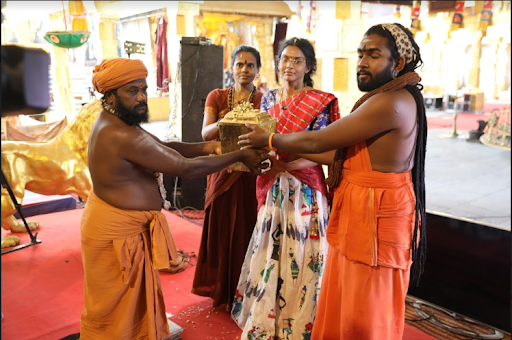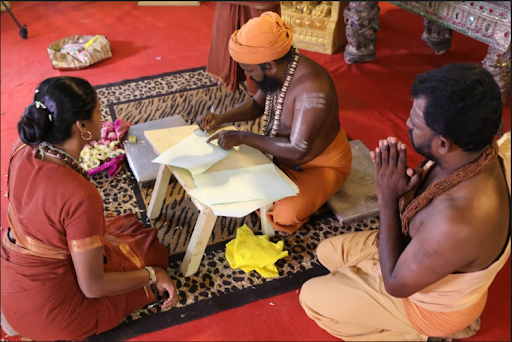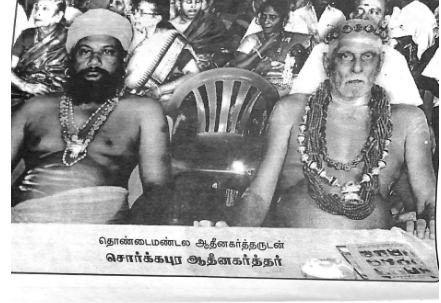Difference between revisions of "Kailaasa Paramparagatha Suvarnapeetha Sarvajnapeetha Swargapuram Samrajyam"
Sri.Akshay (talk | contribs) |
Sri.Akshay (talk | contribs) |
||
| Line 3: | Line 3: | ||
The Kailaasa Paramparagatha Sarvajñapiṭha Suvarnapeetha Swargapura Samrajya is located in the South of India, predominantly in the state of Kerela. The Swargapura Samrajya (State and Spiritual Kingdom), was established by Paramaśiva who incarnated as Swarna Siddhar in Tiruvannamalai. From its original founder Bhagavān Śrī Paramaśiva and currently His Divine Holiness Bhagavān Śrī Nithyananda Paramaśivam, The Swargapura Samrajya represents an authentic spiritual ecosystem and kingdom. | The Kailaasa Paramparagatha Sarvajñapiṭha Suvarnapeetha Swargapura Samrajya is located in the South of India, predominantly in the state of Kerela. The Swargapura Samrajya (State and Spiritual Kingdom), was established by Paramaśiva who incarnated as Swarna Siddhar in Tiruvannamalai. From its original founder Bhagavān Śrī Paramaśiva and currently His Divine Holiness Bhagavān Śrī Nithyananda Paramaśivam, The Swargapura Samrajya represents an authentic spiritual ecosystem and kingdom. | ||
| − | <div style ="text-align:center"> | + | <div style="text-align:center"> |
{{#hsimg:1|300|image1.jpg|http://drive.google.com/uc?export=view&id=1W1j3oKGJdMYcRUuIjJlTKgSgZuA7HKze}} | {{#hsimg:1|300|image1.jpg|http://drive.google.com/uc?export=view&id=1W1j3oKGJdMYcRUuIjJlTKgSgZuA7HKze}} | ||
| Line 15: | Line 15: | ||
The presiding deity is the deity of Paramaśiva and His Divine Consort (Seen on the right). The deities are called Arulmigu Maruthuvaneshwarar Swami and His Consort Sri Atchayanayaki Amman. | The presiding deity is the deity of Paramaśiva and His Divine Consort (Seen on the right). The deities are called Arulmigu Maruthuvaneshwarar Swami and His Consort Sri Atchayanayaki Amman. | ||
| − | <gallery mode=packed heights=400px> | + | <gallery mode="packed" heights="400px"> |
| − | |||
File:Sri-La-Sri-Azhagiya-Tiruchittrambala-Desikar-1-746x1024.png|alt=see caption|Sri La Sri Azhagiya Tiruchittrambala Desikar | File:Sri-La-Sri-Azhagiya-Tiruchittrambala-Desikar-1-746x1024.png|alt=see caption|Sri La Sri Azhagiya Tiruchittrambala Desikar | ||
| − | |||
File:The-presiding-deities-Arulmigu-Maruthuvaneshwarar-Swami-1-661x1024.jpg|alt=see caption|One of the presiding deities, Arulmigu Maruthuvaneshwarar Swami | File:The-presiding-deities-Arulmigu-Maruthuvaneshwarar-Swami-1-661x1024.jpg|alt=see caption|One of the presiding deities, Arulmigu Maruthuvaneshwarar Swami | ||
| − | |||
File:The-presiding-deity-Sri-Atchayanayaki-Amman-Arulmigu-Maruthuvaneswarars-consort-1-673x1024.jpg|alt=see caption|One of the presiding deities, Sri Atchayanayaki Amman the Consort of Arulmigu Maruthuvaneshwarar Swami | File:The-presiding-deity-Sri-Atchayanayaki-Amman-Arulmigu-Maruthuvaneswarars-consort-1-673x1024.jpg|alt=see caption|One of the presiding deities, Sri Atchayanayaki Amman the Consort of Arulmigu Maruthuvaneshwarar Swami | ||
| − | |||
</gallery> | </gallery> | ||
| Line 31: | Line 27: | ||
The Chera King at the time had a daughter who had fallen fatally ill. On being approached by the King for healing, the powerful Sage Thamba healed her even before the king verbalised the reason for which he had approached the Sage. Out of sheer gratitude for this selfless act, the king decided to bequeath the sage Thamba with wealth, land and facilities, which the Sage gave to his disciple, Sri la Sri Azhagiya Thiruchittrambala Desika Bandara Sannadhi. | The Chera King at the time had a daughter who had fallen fatally ill. On being approached by the King for healing, the powerful Sage Thamba healed her even before the king verbalised the reason for which he had approached the Sage. Out of sheer gratitude for this selfless act, the king decided to bequeath the sage Thamba with wealth, land and facilities, which the Sage gave to his disciple, Sri la Sri Azhagiya Thiruchittrambala Desika Bandara Sannadhi. | ||
| − | <gallery mode=packed heights=400px> | + | <gallery mode="packed" heights="400px"> |
| − | |||
File:Chera-Kingdom.png|alt=see caption|The Chera Kingdom | File:Chera-Kingdom.png|alt=see caption|The Chera Kingdom | ||
| − | |||
</gallery> | </gallery> | ||
The Kingdom of Swargapura flourished with abundant lands, an anna daan mutt, educational institutions, charity organisations, felicitation of scholarly poets, helping the needy who come to the mutt, flourishing of teachings of Saiva Siddhanta, hospitals, giving protection and helping the orphans, a spatika (crystal) Linga and the pūjā methods to offer worship to it, teaching the traditions specific to the lineage of acharyas (rulers), and enlightenment. | The Kingdom of Swargapura flourished with abundant lands, an anna daan mutt, educational institutions, charity organisations, felicitation of scholarly poets, helping the needy who come to the mutt, flourishing of teachings of Saiva Siddhanta, hospitals, giving protection and helping the orphans, a spatika (crystal) Linga and the pūjā methods to offer worship to it, teaching the traditions specific to the lineage of acharyas (rulers), and enlightenment. | ||
| − | <gallery mode=packed heights=400px> | + | <gallery mode="packed" heights="400px"> |
| − | |||
File:Sri-La-Sri-Dandapani-Desika-Pandara-Sannadhi-1024x756.jpg|alt=see caption|The 22nd Pontiff Sri La Sri Dandapani Desika Pandara Sannadhi, offers his everyday worship, to the presiding deities of this Spiritual Seat, keeping the enlightenment eco system aliv | File:Sri-La-Sri-Dandapani-Desika-Pandara-Sannadhi-1024x756.jpg|alt=see caption|The 22nd Pontiff Sri La Sri Dandapani Desika Pandara Sannadhi, offers his everyday worship, to the presiding deities of this Spiritual Seat, keeping the enlightenment eco system aliv | ||
| − | |||
File:The-deities-of-the-Swargapuram-Aadheenam.jpg|alt=see caption|The deities of the Swargapuram Aadheenam | File:The-deities-of-the-Swargapuram-Aadheenam.jpg|alt=see caption|The deities of the Swargapuram Aadheenam | ||
| − | |||
</gallery> | </gallery> | ||
| − | |||
| − | |||
| − | |||
| − | |||
| − | |||
| − | |||
| − | |||
| − | |||
| − | |||
| − | |||
| − | |||
| − | |||
| − | |||
| − | |||
| − | |||
| − | |||
| − | |||
| − | |||
| − | |||
| − | |||
| − | |||
| − | |||
| − | |||
| − | |||
| − | |||
| − | |||
| − | |||
| − | |||
| − | |||
| − | |||
| − | |||
| − | |||
| − | |||
| − | |||
| − | |||
| − | |||
| − | |||
| − | |||
| − | |||
| − | |||
| − | |||
| − | |||
| − | |||
| − | |||
| − | |||
==Founder and Reviver of Swargapuram Samrajyam== | ==Founder and Reviver of Swargapuram Samrajyam== | ||
| Line 100: | Line 46: | ||
Paramaśiva, the Cosmic Source and ultimate Divinity, started the Swargapuram Samrajyam, both the state and the spiritual kingdom. | Paramaśiva, the Cosmic Source and ultimate Divinity, started the Swargapuram Samrajyam, both the state and the spiritual kingdom. | ||
| − | <gallery mode=packed heights=400px> | + | <gallery mode="packed" heights="400px"> |
| − | + | File:ParamashivaDigital.jpg|alt=see caption | |
| − | File:ParamashivaDigital.jpg|alt=see caption | ||
| − | |||
</gallery> | </gallery> | ||
| Line 110: | Line 54: | ||
===Sri Swarna Siddhar=== | ===Sri Swarna Siddhar=== | ||
| − | <gallery mode=packed heights=400px> | + | <gallery mode="packed" heights="400px"> |
| − | |||
File:Sri-Swarna-Siddhar.jpg|alt=see caption|Sri Swarna Siddhar, incarnation of Paramaśiva in deity form | File:Sri-Swarna-Siddhar.jpg|alt=see caption|Sri Swarna Siddhar, incarnation of Paramaśiva in deity form | ||
| − | |||
</gallery> | </gallery> | ||
| Line 149: | Line 91: | ||
Arulmigu Amrithakadeshwarar Tirukkovil, Andakkudi, Northeast of the Swargapura Aadheenam | Arulmigu Amrithakadeshwarar Tirukkovil, Andakkudi, Northeast of the Swargapura Aadheenam | ||
| + | ===Branches Affiliated to the Swargapuram Kingdom=== | ||
| + | |||
| + | There are 40 branches affiliated to this Kingdom. 20 of them in South India are recalled here: | ||
| + | |||
| + | 1. Nagappattinam District Ambala village | ||
| + | |||
| + | 2. Seerkazhi Circle, Tiruvengaadu | ||
| + | |||
| + | 3. Seerkazhi Aachaalpuram | ||
| + | |||
| + | 4. Tiruchirapalli Keezhachinthaamani | ||
| + | |||
| + | 5. Seerkazhi Circle, Tillayaadi | ||
| + | |||
| + | 6. Thanjavur Kudavaayil | ||
| + | |||
| + | 7. Chidambaram Senkizhani Pillayar Kovil Street | ||
| + | |||
| + | 8. Tiruvarur Anna daana mutt | ||
| + | |||
| + | 9. Tirunellaar, Terku veethi (South Street) | ||
| + | |||
| + | 10. Tirunelveli Tirupadaimaruthur | ||
| + | 11. Tirunelveli Naanguneri vaamaalai anna daana mutt | ||
| − | + | 12. Thanjavur karanthai anna daana mutt | |
| − | + | 13. Naagoor Muthiah Chettiar Street anna daana mutt | |
| + | |||
| + | 14. Nagappatinam nagaram Dharmapuri saalai anna daana mutt | ||
| + | |||
| + | 15. Muthupettai Saamyaan Oodai anna daana mutt | ||
| + | |||
| + | 16. Maayooram nagaram No. 5, Puthu street annadaana mutt | ||
| − | + | 17. Kasi Gangai karai anna daana mandapam | |
| − | |||
| − | |||
| − | |||
| − | |||
| − | |||
| − | |||
| − | |||
| − | |||
| − | |||
| − | |||
| − | |||
| − | |||
| − | |||
| − | |||
| − | |||
| − | |||
| − | |||
| − | |||
| − | |||
| + | 18. Thanjai Karunthaattaankudi annadaana mutt | ||
| + | 19. Thoothukkudi nagaram uppalam paguthi (area) | ||
| + | 20. Thanjai jilla Ayyampettai anna daana mutt (Rajagiri) | ||
==Divine Lineage of Swargapuram Samrajyam== | ==Divine Lineage of Swargapuram Samrajyam== | ||
| Line 218: | Line 174: | ||
Tenure: 1410 - 1499 | Tenure: 1410 - 1499 | ||
| − | <gallery mode=packed heights=400px> | + | <gallery mode="packed" heights="400px"> |
| − | |||
File:7.jpg|alt=see caption|Picture of the sannidhanam in deity form | File:7.jpg|alt=see caption|Picture of the sannidhanam in deity form | ||
| − | |||
</gallery> | </gallery> | ||
| Line 480: | Line 434: | ||
Tenure: 1881 - 1928 | Tenure: 1881 - 1928 | ||
| + | == '''Temples of Swargapuram Kingdom''' == | ||
| + | === '''Ambar Mahakalam Koil''' === | ||
| + | This ancient temple is situated on the northern banks of the river Arasalaru. As per the stone inscriptions available in this temple, the temple was first built in the 12th Century AD by King Kulothunga Cholan-I and later extended by King Vikrama Cholan. The historical names of this place are Marapuri and Indirapuri. | ||
| + | === '''Puranic History of Ambar Mahakalam Koil''' === | ||
| + | |||
| + | ==== '''Bhadrakaali''' ==== | ||
| + | It is said in Hindu Scriptures that Sage Durvasa (an incarnation of Lord Paramashiva) was once traveling to worship Paramashiva in the form of Sri Brahmapureeswarar (where Paramashiva is worshipped as Lord of the Universe). On his way, a demon-woman named Madhalolai saw him and fell in love with him. She pleaded for a child through him. He blessed her, and she conceived two demonic children named Amban and Ambarasuran. When she breastfed her two children, they drank her blood instead. In this way, she died, but before dying she told her two children to worship Brahmapureeswarar. They obeyed her and worshipped Paramashiva in this form every day. They grew to be skilled fighters, archers and wrestlers. | ||
| + | |||
| + | However, due to their demonic nature, as they grew older, they killed many humans and even tried to kill Devas (divine beings). All the Devas and sages rushed to Lord Paramashiva to address this problem. However, as the two demons’ powers came from the devotion that they had towards Paramashiva, He was could not stop them nor take back his boons. Hence, they turned to Devi parvati, the divine consort of Lord Paramashiva, to help defeat these demons. Devi parvati then, assumed the form of a Mohini, a seductive and beautiful maiden. She was accompanied by Lord Vishnu, who took the form of an old man. They made their way to a temple in Thanjavur dedicated to Lord Vishnu called the Veetrirundha Perumal koil. People began to gather there, and the men in the kingdom began to line up in asking for the beautiful Mohini’s hand in marriage. Hearing of this, Amban and Ambarasuran rushed to the temple. They saw Devi Parvati in the form of Mohini and both fell in love with her. They individually expressed their wish to marry her, but Vishnu, in the form of the old man advised them that she would only choose one of them, and she would choose who is fit to marry her amongst them. | ||
| + | |||
| + | Hearing this, both the demons began to fight with each other. Amban won the fight, and in doing so, killed his brother Ambarasuran. | ||
| + | |||
| + | Upon victory, amban turned to the Mohini to finally ask for her hand in marriage. However, when he turned to her, he saw that she had turned into Bhadrakaali - a ferocious form of Devi parvati. He became extremely afraid and transformed into a bull, and ran away from her. This place, where Amban transformed into a bull, is called Kidamangalam. On seeing him run, Bhadrakaali ran after him and killed him with her trishul (trident) at a place called Ambagarathur. To this day, the soil in Ambagarathur is naturally red, marking the spot where Bhadrakaali defeated this demon. | ||
| + | |||
| + | After this incident, the people of the village requested Bhadrakaali to reside there and protect them always. Thus, she stands in the temple, facing North (which gives her the name Vatabhadra Kali). | ||
| + | |||
| + | The temple was initially known as Ambara-harattur meaning victory over Ambaran, which subsequently became Ambagarathur. | ||
| + | |||
| + | However, since Bhadrakaali had committed Brahmahatya (the sin of killing of brahmins, the priestly caste in Hinduism), one of the gravest sins to commit, she created a Shiva Linga with her own hands in Thirumangalam village and worshipped it to clear the repercussions of this. This Shiva Linga is now worshipped in an adjacent temple called Kovil Thirumahalam. Anyone with the dosha (sin) of Brahmahatya can worship Paramashiva at this temple to be free of it. | ||
| + | |||
| + | Anyone who goes to the Ambar Mahakalam Koil to worship Bhadrakaali must also go to the Kovil Thirumahalam to worship Paramashiva in order to finish the entire ritual of visiting this temple. | ||
| + | |||
| + | <br /> | ||
| + | |||
| + | ==== '''Raja Matangi''' ==== | ||
| + | Many years later, a sage named Madanga Maharishi lived in the same village. He was an ardent devotee of Lord Paramashiva. Due to his sincere love and devotion, Paramashiva appeared before Madanaga Maharishi in the form of Shanteshwara, and decided to live in that place in the form of a Shiva Linga which is now called the Mathangeeswara Shiva Linga. Madanga Maharishi also prayed for a boon to have a child, and Lord Paramashiva blessed him with a daughter who was an incarnation of Devi (consort of Lord Paramashiva) Herself. She was named Raja Matangi. When she grew older, she prayed to Paramashiva for the boon to marry him. He granted her this boon, and she married Paramashiva at this temple. Since then, the deities of this temple are known for granting boons of successful marriage to all the young couples and unmarried persons who come here. An unmarried couple can bring two red Oleander(Arali flower) garlands for the deities and perform archanas (rituals and offerings). After that, the boy or girl should get back one garland and wear it. | ||
| + | |||
| + | |||
| + | ==== '''Somayaji Mara Nayanar''' ==== | ||
| + | Somayaji Mara Nayanar is one among the sixty three Nayanmars (saint-poets known for their devotion to Paramashiva). He wanted to perform Somayagam with his wife Suseelai in this temple on the day of Vaikasi Ayilyam star (2nd day of the Vaikasi Brahmotsavam festival). He was going to perform a yaga, ( a fire ritual) in the temple and wanted Paramashiva Himself to accept the offerings and attend the yagam. Another of the Nayanmars, Sundarar, had fallen ill, and Somayaji Mara Nayanar had healed him.Then, Somayaji Nayanar asked for Sundarar to help him invite Paramashiva for his Yagam. Sundarar agreed, and Paramashiva appeared before them, saying that he would surely come for the yagam. However, his only condition was that Somayaji Nayanar should welcome Him in whatever form he appeared, no matter how ghastly. Somayaji Nayanar agreed and on the day of the yagam, he waited eagerly to spot Lord Paramashiva. At the time of offering the final oblations, a poor and haggard-looking man walked in with his wife and a dead calf on his shoulder. Four dogs accompanied him. Many were frightened at this sight and left the ceremony, taking it as a sign of inauspiciousness. However, Vinayagar, the son of Paramashiva, appeared and revealed that this poor man was Paramashiva Himself, accompanied by Devi and Skanda (his consort and son), the dead calf was Nandi (his protector) and the four dogs were the four Vedas (source scriptures of Hinduism). He was overjoyed and welcomed them to the yagam, offering the oblations to Paramashiva Himself as per his wish. | ||
| + | |||
| + | ==== '''Arunachaleshwarar Temple''' ==== | ||
| − | |||
| − | + | ==== '''Aabathsagaeeswarar Temple''' ==== | |
| − | |||
| − | + | ==== '''Brahmapureeswarar Temple''' ==== | |
| − | |||
| − | < | + | ==== '''Mahakalanathar Temple''' ==== |
| + | <br /> | ||
| + | ==Coronation of His Divine Holiness== | ||
| − | + | The Kailaasa Paramparagatha Suvarnapeetha Sarvajnapeetha Swargapuram Samrajyam was handed over to His Divine Holiness in the year 2015 fulfilling the traditional ritualistic procedure. In 2018-19 Dandapani Desika Pandara Sannadhi, the 22nd Pontiff of the Swargapuram Adheenam initiated and completed the official documentation for the same. | |
| + | <gallery mode="packed" heights="400px"> | ||
| + | File:SwargDeity.png|alt=see caption|22nd Guru Maha Sannidhanam ceremoniously passing on the traditional deity of the Aadheenam to be worshipped only by the Pontiff to the direct representatives of His Divine Holiness Bhagavan Sri Nithyananda Paramashivam | ||
</gallery> | </gallery> | ||
| − | <gallery mode=packed heights=400px> | + | <gallery mode="packed" heights="400px"> |
| − | + | File:Swargapuramsignature.png|alt=see caption|Legally declaring His Divine Holiness as the Pontiff of the Kailaasa Paramparagatha Suvarnapeetha Sarvajnapeetha Swargapuram Samrajyam | |
| − | File: | + | </gallery> |
| + | <gallery mode="packed" heights="400px"> | ||
| + | File:Thondaiswarg.png|alt=see caption|A rare photograph featuring (Left) Dandapani Desika Pandara Sannadhi, the 22nd Pontiff of the Swargapuram Adheenam and (Right) 232nd Guru Maha Sannidhanam of Thondaimandalam Aadheenam, both of whom appointed His Divine Holiness as their successor in their respective kingdoms. | ||
</gallery> | </gallery> | ||
Revision as of 10:03, 26 October 2020
The Ancient Kingdom of the Cheras in South India
The Kailaasa Paramparagatha Sarvajñapiṭha Suvarnapeetha Swargapura Samrajya is located in the South of India, predominantly in the state of Kerela. The Swargapura Samrajya (State and Spiritual Kingdom), was established by Paramaśiva who incarnated as Swarna Siddhar in Tiruvannamalai. From its original founder Bhagavān Śrī Paramaśiva and currently His Divine Holiness Bhagavān Śrī Nithyananda Paramaśivam, The Swargapura Samrajya represents an authentic spiritual ecosystem and kingdom.
History of Swargapuram Aadheenam
The Kailaasa Paramparagatha Sarvajñapiṭha Suvarnapeetha Swargapura Samrajya (spiritual and religious kingdom), was established by Paramaśiva and revived in the 12th century by the Mahan (great Seer), Sri La Sri Azhagiya Tiruchittrambala Desikar (seen in the photograph on the left). He was the son of Śiva Tiru Śivajnana Desika Ācāryar and Sivakamasundari. He attained enlightenment at the age of 7 with his Guru, the Sage Thamba.
The presiding deity is the deity of Paramaśiva and His Divine Consort (Seen on the right). The deities are called Arulmigu Maruthuvaneshwarar Swami and His Consort Sri Atchayanayaki Amman.
The Kailaasa Paramparagatha Suvarnapeetha Sarvajnapeetha Swargapuram Samrajyam was established by Paramasiva and revived by Sri la Sri Azhagiya Thiruchittrambala Desika Bandara Sannadhi, who hails from the direct lineage of Paramaśiva, through his guru, Sage Thamba, one of the 18 sages in Hindu History.
The Aadheenam is located in the Tiruvarur district, Nannilam Circle which was a region falling within the reign of the Chera Kingdom or Dynasty.
The Chera King at the time had a daughter who had fallen fatally ill. On being approached by the King for healing, the powerful Sage Thamba healed her even before the king verbalised the reason for which he had approached the Sage. Out of sheer gratitude for this selfless act, the king decided to bequeath the sage Thamba with wealth, land and facilities, which the Sage gave to his disciple, Sri la Sri Azhagiya Thiruchittrambala Desika Bandara Sannadhi.
The Kingdom of Swargapura flourished with abundant lands, an anna daan mutt, educational institutions, charity organisations, felicitation of scholarly poets, helping the needy who come to the mutt, flourishing of teachings of Saiva Siddhanta, hospitals, giving protection and helping the orphans, a spatika (crystal) Linga and the pūjā methods to offer worship to it, teaching the traditions specific to the lineage of acharyas (rulers), and enlightenment.
Founder and Reviver of Swargapuram Samrajyam
Founder
Bhagavān Śrī Paramashiva
Paramaśiva, the Cosmic Source and ultimate Divinity, started the Swargapuram Samrajyam, both the state and the spiritual kingdom.
It is from Bhagavan Sri Paramaśiva, the Primordial Source, who incarnated as Swarna Siddhar in Tiruvannamalai that the kingdom was established. Paramaśiva’s establishment was revived in the 12th century by the Mahan (great Seer), Sri La Sri Azhagiya Tiruchittrambala Desikar. He was the son of Śiva Tiru Śivajnana Desika Ācāryar and Sivakamasundari. He attained enlightenment at the age of 7 with his Guru, the Sage Thamba. The presiding deity is the deity of Paramaśiva and His Divine Consort. The deities are called Arulmigu Maruthuvaneshwarar Swami and His Consort Sri Atchayanayaki Amman.
Sri Swarna Siddhar
Power manifestation to help the people
The Swargapuram Aadheenam is built on the Samādhi (final resting place) of the great Swarna Siddhar (Seen in picture in deity form). Paramasiva Himself incarnated as this Sage, taking birth in Tiruvannamalai, South India. He lived as an extraordinary spiritual power manifestor helping the poor and needy with his spiritual powers, manifesting gold for them.
Appeasing the wrath of Bhadrakali
Hindu history records that there were two demons who roamed the area where the Kingdom stands today. In order to slay these demons, Goddess Pārvati, the embodiment of Feminine Superconsciousness, descended in a ferocious form called Bhadrakali. At that time, Swarna Siddhar Mahan was in the midst of astral-travel over this region. He landed in the spot to pay obeisance to the Divine Mother. He requested her to reveal her shantarūpa, her serene form which itself would destroy the negativity and enlighten people. To please her, he performed the Svarna maha yagam – a powerful fire ritual. Pleased by him, Goddess Pārvati shed her ferocious form and blessed him.
Disciples seek him out
Meanwhile, drawn by the powerful vibrations of his chanting, the Siddhar (mystics) who were meditating nearby namely Suryananda Siddhar, Kurmananda Siddhar, Swarupananda Siddhar, Sangili Siddhar, Sattanatha Siddhar sought him out and spoke thus, “You are the Mahānubhāva (Great Saint) who pacified the Mahādevī (referring to Bhadrakāli) who could not be pacified by anyone.” So saying they humbly requested him to accept them as his disciples. They then took leave from him.
The king surrenders
The Swarna Siddhar gave refuge to princes who fled their kingdoms when conquered by the powerful kings. He empowered them to successfully win their kingdoms back. Disapproving Swarna Siddhar’s act, the king sent his men to find him but in vain. However Swarna Siddhar himself sought out the king in his kingdom. Using his spiritual powers, the Siddhar subjugated the king. The king surrendered to his powerful Presence and gave him all his territory. The Siddhar then divided the territory appropriately.
He and his attain Jīva Samādhi
Swarna Siddhar left his body along with the rare and powerful naagam (a snake that used to live with him). Cognising through their power of enlightenment that the Siddhar has attained jīva samādhi (rested his body), the five disciples also attained jīva samādhi (final resting) in their respective places. The day they attained jīva samādhi was Chitra Pournami.
On the Siddhar’s jīva samādhi, years later, Arulmigu Azhagiya Tiruchitrambala Desikar ruled as Pontiff of the Swargapura Aadheenam.
In the five places where the five disciples attained jīva samādhi, five Śiva temples got created.
Arulmigu Mahagaananaatha Swami Tirukkovil – West of the Swargapura Aadheenam
Arulmigu Brahmapureeshwarar Tirukkovil – Ambal – East of the Swargapura Aadheenam
Arulmigu Aabathsagaayeshwarar Tirukkovil, Kongaraaya Nalloor – South of the Swargapura Aadheenam
Arulmigu Arunachaleshwarar Tirukkovil, Agarathurumaana – Northwest of the Swargapura Aadheenam
Arulmigu Amrithakadeshwarar Tirukkovil, Andakkudi, Northeast of the Swargapura Aadheenam
Branches Affiliated to the Swargapuram Kingdom
There are 40 branches affiliated to this Kingdom. 20 of them in South India are recalled here:
1. Nagappattinam District Ambala village
2. Seerkazhi Circle, Tiruvengaadu
3. Seerkazhi Aachaalpuram
4. Tiruchirapalli Keezhachinthaamani
5. Seerkazhi Circle, Tillayaadi
6. Thanjavur Kudavaayil
7. Chidambaram Senkizhani Pillayar Kovil Street
8. Tiruvarur Anna daana mutt
9. Tirunellaar, Terku veethi (South Street)
10. Tirunelveli Tirupadaimaruthur
11. Tirunelveli Naanguneri vaamaalai anna daana mutt
12. Thanjavur karanthai anna daana mutt
13. Naagoor Muthiah Chettiar Street anna daana mutt
14. Nagappatinam nagaram Dharmapuri saalai anna daana mutt
15. Muthupettai Saamyaan Oodai anna daana mutt
16. Maayooram nagaram No. 5, Puthu street annadaana mutt
17. Kasi Gangai karai anna daana mandapam
18. Thanjai Karunthaattaankudi annadaana mutt
19. Thoothukkudi nagaram uppalam paguthi (area)
20. Thanjai jilla Ayyampettai anna daana mutt (Rajagiri)
Divine Lineage of Swargapuram Samrajyam
Predecessors
Disciples were appointed in later times to run the mutt as successors.
A Śiva temple in the name Sri Maruthuvana Swami was established and all the pontiffs were to rule assuming the title “Sri La Sri Maruthuvana Swami”.
Succeeding Sri La Sri Azhagiya Tiruchitrambala Desikar, the following served as Pontiffs. This table contains the details of the Name, Month of attaining samādhi, the vedic nakshatra on which samādhi was attained and the location of the samādhi, of all the Sannidhanams (Pontiffs) who have graced the Swargapura Aadheenam Svarna MahaPeetham (Kingdom).
Description of the Sannidhanam (Pontiff)
1. Title: Adheena Gurumudalvar Gurumahasannidhanama Arul Thiru Sri la Sri Marudavana Swami
Name: Sri la Sri Azhagiya Thiruchittrambala Desika Bandara Sannadhi
Attained jīva samādhi on
Month: Karthikai
Nakshatram:Punarpusam
Jīva Samādhi Location: Headquarters of the mutt of Bandara Sannadhi in Thirumalam.
Tenure: 1200 to 1410
2. Title: Arul Thiru Irandavathu Gurumahasannithanam Sri la Sri Marudavana Swami
Name: Sri la Sri Vaidhyalinga Desika Bandara Sannadhi
Attained samādhi on
Month: Karthikai
Nakshatram: Pusam
Samādhi Location: Ambal,Sandhai Velimedu
Tenure: 1410 - 1499
3. Title: Arul Thiru Mundravathu Gurumahasannithanam Sri la Sri Marudavana Swami
Name: Sri la Sri Tavaprakasha Desika Bandara Sannadhi
Attained samādhi on
Month: Chitra
Nakshatram: Thiruvadurai
Samādhi Location:Thiruvenkaadu Therku veedi madam
Tenure: 1499 - 1564
4. Title: Arul Thiru Nangavathu Gurumahasannithanam Sri la Sri Marudavana Swami
Name: Sri la Sri Mutthukumar Desika Bandara Sannadhi
Attained samādhi on
Month: Aadi
Nakshatram: Rohini
Samādhi Location: Ambal, Sandhai Velimedu
Tenure: 1564 - 1595
5. Title: Arul Thiru Einthavathu Gurumahasannithanam Sri la Sri Marudavana Swami
Name: Sri la Sri Ambalavana Desika Bandara Sannadhi
Attained samādhi on
Month: Chitra
Nakshatram: Swathi
Samādhi Location: Ambal, Sandhai Velimedu
Tenure: 1595 - 1610
6. Title: Arul Thiru Aravathu Gurumahasannithanam Sri la Sri Marudavana Swami
Name: Sri la Sri Azhagiya Thiruchittrambala Desika Bandara Sannadhi
Attained samādhi on
Month: Maasi
Nakshatram: Revati
Samādhi Location: Kasi in Branch Mutt
Tenure: 1610 - 1659
7. Title: Arul Thiru Ezhavathu Gurumahasannithanam Sri la Sri Marudavana Swami
Name: Sri la Sri Sivajnana Desika Bandara Sannadhi
Attained samādhi on
Month: Thai
Nakshatram: Magha
Samādhi Location: North of the Mutt , Nokar Theru
Birth Place: Madurai
Tenure: 1659 - 1680
8. Title: Arul Thiru Ettavathu Gurumahasannithanam Sri la Sri Marudavana Swami
Name: Sri la Sri Panchangira Desika Bandara Sannadhi
Attained samādhi on
Month: Karthika
Nakshatram: Mrigashirsha
Samādhi Location: North of the Mutt , Nokar Theru
Birth Place: Madurai
Tenure: 1680 - 1720
9. Title: Arul Thiru Onbathavathu Gurumahasannithanam Sri la Sri Marudavana Swami
Name: Sri la Sri Saravana Swami Desika Bandara Sannadhi
Attained samādhi on
Month: Avani
Nakshatram: Poosam
Samādhi Location: Thirunallar Therku veedi madam
Tenure: 1720 - 1742
10. Title: Arul Thiru Patthavathu Gurumahasannithanam Sri la Sri Marudavana Swami
Name: Sri la Sri Sivaprakasha Desika Bandara Sannadhi
Attained samādhi on
Month: Vaikasi
Nakshatram: Barani
Samādhi Location: Naakur, Cheetitheru Madam
Tenure: 1742 - 1762
11. Title: Arul Thiru Pathinondravathu Gurumahasannithanam Sri la Sri Marudavana Swami
Name: Sri la Sri Subramanya Desika Bandara Sannadhi
Attained samādhi on
Month: Avani
Nakshatram: Thiruonam
Samādhi Location: Mutthupettai, Sambhubvanodai,Thennan Thopu
Tenure: 1762 - 1772
12. Title: Arul Thiru Panirendavathu Gurumahasannithanam Sri la Sri Marudavana Swami
Name: Sri la Sri Shivananda Swami Desika Bandara Sannadhi
Attained samādhi on
Month: Avani
Nakshatram: Thiruonam
Samādhi Location: Thiruchirapalli, Kilchinatamani Madam
Tenure: 1772 - 1780
13. Title: Arul Thiru Pathimundravathu Gurumahasannithanam Sri la Sri Marudavana Swami
Name: Sri la Sri Desika Sangili Thirumeni Swami Bandara Sannadhi
Attained samādhi on
Month: Chitra
Nakshatram: Ashwini
Samādhi Location: North of the Mutt , Nokar Theru
Tenure: 1780 - 1795
14. Title: Arul Thiru Pathinangavathu Gurumahasannithanam Sri la Sri Marudavana Swami
Name: Sri la Sri Chettitirumeni Desika Swami Bandara Sannadhi
Attained samādhi on
Month: Panguni
Nakshatram: Uttiram
Samādhi Location: Ambal,Branch mutt near Mariamman Temple
Tenure: 1795 - 1821
15. Title: Arul Thiru Pathinainthavathu Gurumahasannithanam Sri la Sri Marudavana Swami
Name: Sri la Sri Ambalavana Desika Swami Bandara Sannadhi
Attained samādhi on
Month: Vaikasi
Nakshatram: Vishaka
Samādhi Location: Tirunelveli, Tirupadai Marudur Madam
Tenure: 1821 - 1836
16. Title: Arul Thiru Pathinaravathu Gurumahasannithanam Sri la Sri Marudavana Swami
Name: Sri la Sri Sivaprakasha Desika Swami Bandara Sannadhi
Attained samādhi on
Month: Marghazhi
Nakshatram: Ayilyam
Samādhi Location: Nokar theru
Tenure: 1836 - 1840
17. Title: Arul Thiru Pathinezhavathu Gurumahasannithanam Sri la Sri Marudavana Swami
Name: Sri la Sri Sivavaakiya Desika Swami Bandara Sannadhi
Attained samādhi on
Month: Thai
Nakshatram: Magha
Samādhi Location: Maayuram madam
Tenure: 1840 - 1860
18. Title: Arul Thiru Pathinettavathu Gurumahasannithanam Sri la Sri Marudavana Swami
Name: Sri la Sri Subramaniya Desika Swami Bandara Sannadhi
Attained samādhi on
Month: Avani
Nakshatram: Poosam
Samādhi Location: Kudavasal Madam
Birth Place: Tirunelveli
Tenure: 1860 - 1861
19. Title: Arul Thiru Pathinonbathavathu Gurumahasannithanam Sri la Sri Marudavana Swami
Name: Sri la Sri Mutthukumara Desika Swami Bandara Sannadhi
Attained samādhi on
Month: Karthikai
Nakshatram: Mrigashirsha
Samādhi Location: Thirunallar, Therku Veedi Madam
Tenure: 1861 - 1881
20. Title: Arul Thiru Iruvathavathu Gurumahasannithanam Sri la Sri Marudavana Swami
Name: Sri la Sri Sadashiva Desika Swami Bandara Sannadhi
Attained samādhi on
Month: Aypasi
Samādhi Location:Thiruvidai, Marudur Madam
Tenure: 1881 - 1928
Temples of Swargapuram Kingdom
Ambar Mahakalam Koil
This ancient temple is situated on the northern banks of the river Arasalaru. As per the stone inscriptions available in this temple, the temple was first built in the 12th Century AD by King Kulothunga Cholan-I and later extended by King Vikrama Cholan. The historical names of this place are Marapuri and Indirapuri.
Puranic History of Ambar Mahakalam Koil
Bhadrakaali
It is said in Hindu Scriptures that Sage Durvasa (an incarnation of Lord Paramashiva) was once traveling to worship Paramashiva in the form of Sri Brahmapureeswarar (where Paramashiva is worshipped as Lord of the Universe). On his way, a demon-woman named Madhalolai saw him and fell in love with him. She pleaded for a child through him. He blessed her, and she conceived two demonic children named Amban and Ambarasuran. When she breastfed her two children, they drank her blood instead. In this way, she died, but before dying she told her two children to worship Brahmapureeswarar. They obeyed her and worshipped Paramashiva in this form every day. They grew to be skilled fighters, archers and wrestlers.
However, due to their demonic nature, as they grew older, they killed many humans and even tried to kill Devas (divine beings). All the Devas and sages rushed to Lord Paramashiva to address this problem. However, as the two demons’ powers came from the devotion that they had towards Paramashiva, He was could not stop them nor take back his boons. Hence, they turned to Devi parvati, the divine consort of Lord Paramashiva, to help defeat these demons. Devi parvati then, assumed the form of a Mohini, a seductive and beautiful maiden. She was accompanied by Lord Vishnu, who took the form of an old man. They made their way to a temple in Thanjavur dedicated to Lord Vishnu called the Veetrirundha Perumal koil. People began to gather there, and the men in the kingdom began to line up in asking for the beautiful Mohini’s hand in marriage. Hearing of this, Amban and Ambarasuran rushed to the temple. They saw Devi Parvati in the form of Mohini and both fell in love with her. They individually expressed their wish to marry her, but Vishnu, in the form of the old man advised them that she would only choose one of them, and she would choose who is fit to marry her amongst them.
Hearing this, both the demons began to fight with each other. Amban won the fight, and in doing so, killed his brother Ambarasuran.
Upon victory, amban turned to the Mohini to finally ask for her hand in marriage. However, when he turned to her, he saw that she had turned into Bhadrakaali - a ferocious form of Devi parvati. He became extremely afraid and transformed into a bull, and ran away from her. This place, where Amban transformed into a bull, is called Kidamangalam. On seeing him run, Bhadrakaali ran after him and killed him with her trishul (trident) at a place called Ambagarathur. To this day, the soil in Ambagarathur is naturally red, marking the spot where Bhadrakaali defeated this demon.
After this incident, the people of the village requested Bhadrakaali to reside there and protect them always. Thus, she stands in the temple, facing North (which gives her the name Vatabhadra Kali).
The temple was initially known as Ambara-harattur meaning victory over Ambaran, which subsequently became Ambagarathur.
However, since Bhadrakaali had committed Brahmahatya (the sin of killing of brahmins, the priestly caste in Hinduism), one of the gravest sins to commit, she created a Shiva Linga with her own hands in Thirumangalam village and worshipped it to clear the repercussions of this. This Shiva Linga is now worshipped in an adjacent temple called Kovil Thirumahalam. Anyone with the dosha (sin) of Brahmahatya can worship Paramashiva at this temple to be free of it.
Anyone who goes to the Ambar Mahakalam Koil to worship Bhadrakaali must also go to the Kovil Thirumahalam to worship Paramashiva in order to finish the entire ritual of visiting this temple.
Raja Matangi
Many years later, a sage named Madanga Maharishi lived in the same village. He was an ardent devotee of Lord Paramashiva. Due to his sincere love and devotion, Paramashiva appeared before Madanaga Maharishi in the form of Shanteshwara, and decided to live in that place in the form of a Shiva Linga which is now called the Mathangeeswara Shiva Linga. Madanga Maharishi also prayed for a boon to have a child, and Lord Paramashiva blessed him with a daughter who was an incarnation of Devi (consort of Lord Paramashiva) Herself. She was named Raja Matangi. When she grew older, she prayed to Paramashiva for the boon to marry him. He granted her this boon, and she married Paramashiva at this temple. Since then, the deities of this temple are known for granting boons of successful marriage to all the young couples and unmarried persons who come here. An unmarried couple can bring two red Oleander(Arali flower) garlands for the deities and perform archanas (rituals and offerings). After that, the boy or girl should get back one garland and wear it.
Somayaji Mara Nayanar
Somayaji Mara Nayanar is one among the sixty three Nayanmars (saint-poets known for their devotion to Paramashiva). He wanted to perform Somayagam with his wife Suseelai in this temple on the day of Vaikasi Ayilyam star (2nd day of the Vaikasi Brahmotsavam festival). He was going to perform a yaga, ( a fire ritual) in the temple and wanted Paramashiva Himself to accept the offerings and attend the yagam. Another of the Nayanmars, Sundarar, had fallen ill, and Somayaji Mara Nayanar had healed him.Then, Somayaji Nayanar asked for Sundarar to help him invite Paramashiva for his Yagam. Sundarar agreed, and Paramashiva appeared before them, saying that he would surely come for the yagam. However, his only condition was that Somayaji Nayanar should welcome Him in whatever form he appeared, no matter how ghastly. Somayaji Nayanar agreed and on the day of the yagam, he waited eagerly to spot Lord Paramashiva. At the time of offering the final oblations, a poor and haggard-looking man walked in with his wife and a dead calf on his shoulder. Four dogs accompanied him. Many were frightened at this sight and left the ceremony, taking it as a sign of inauspiciousness. However, Vinayagar, the son of Paramashiva, appeared and revealed that this poor man was Paramashiva Himself, accompanied by Devi and Skanda (his consort and son), the dead calf was Nandi (his protector) and the four dogs were the four Vedas (source scriptures of Hinduism). He was overjoyed and welcomed them to the yagam, offering the oblations to Paramashiva Himself as per his wish.
Arunachaleshwarar Temple
Aabathsagaeeswarar Temple
Brahmapureeswarar Temple
Mahakalanathar Temple
Coronation of His Divine Holiness
The Kailaasa Paramparagatha Suvarnapeetha Sarvajnapeetha Swargapuram Samrajyam was handed over to His Divine Holiness in the year 2015 fulfilling the traditional ritualistic procedure. In 2018-19 Dandapani Desika Pandara Sannadhi, the 22nd Pontiff of the Swargapuram Adheenam initiated and completed the official documentation for the same.
